Do You Really Need a Website? Let’s Talk.
You might be thinking, “I already have followers on Instagram or clients through WhatsApp. Do I really need a website?”
Fair question.
But here’s the thing: over 200 million websites are active today, and thousands more go live every day. That’s not by accident.
It’s because more individuals and businesses see the value in owning their space online.
So before you decide, let’s walk through the facts, some logic, and what made me say, “Yes, I need a website too.”
- Why People Think They Don’t Need a Website
- 7 Reasons You Do Need a Website
- Even the Most Followed Celebrities Have Websites
- What Social Media Can’t Do (And What a Website Unlocks)
- Is Building a Website Still Hard or Expensive?
- What Type of Website Do You Need? (With Real-World Use Cases)
- Why I Decided I Needed a Website
- Final Thoughts
- Frequently Asked Questions
Why People Think They Don’t Need a Website
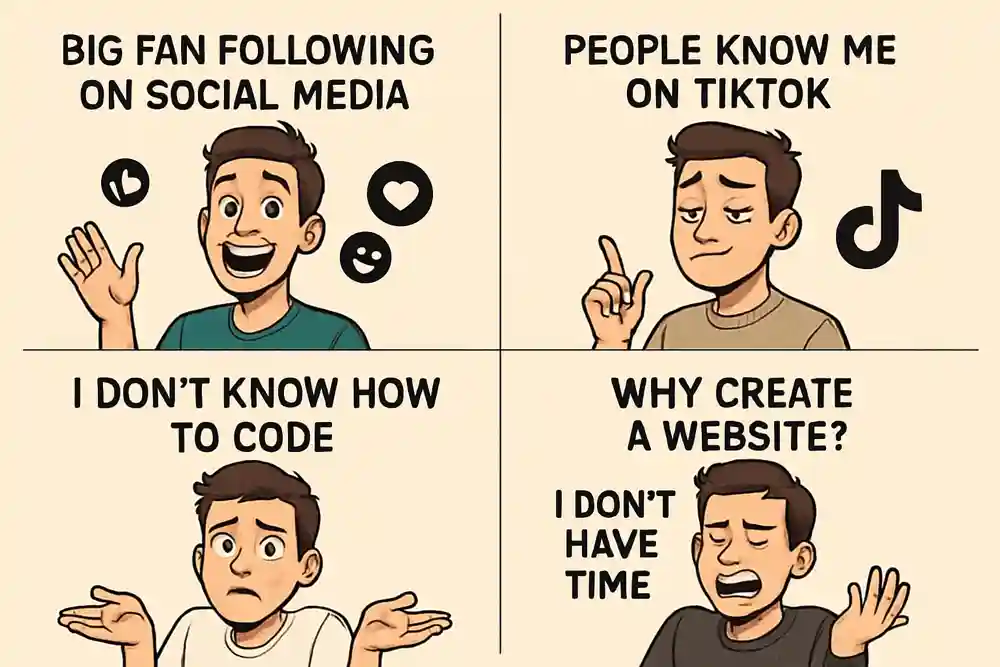
You’ve probably heard these lines before. Maybe you’ve even said one yourself:
- “I already have a big following on Instagram. I sell just fine over there.”
- “People know me on TikTok. Who’s going to visit my site?”
- “I don’t know how to code.”
- “Search engines are changing. AI shows answers now. Why create a website?”
- “Websites are expensive.”
- “I don’t have time to manage one.”
Fair points. But let’s look at each one closely.
“I already sell through Instagram or TikTok.”
Social media is helpful, but it’s not yours.
Your followers belong to the platform. If your account gets hacked, banned, or disappears, you lose everything, overnight.
This has happened to thousands of small businesses. Here’re a few examples:
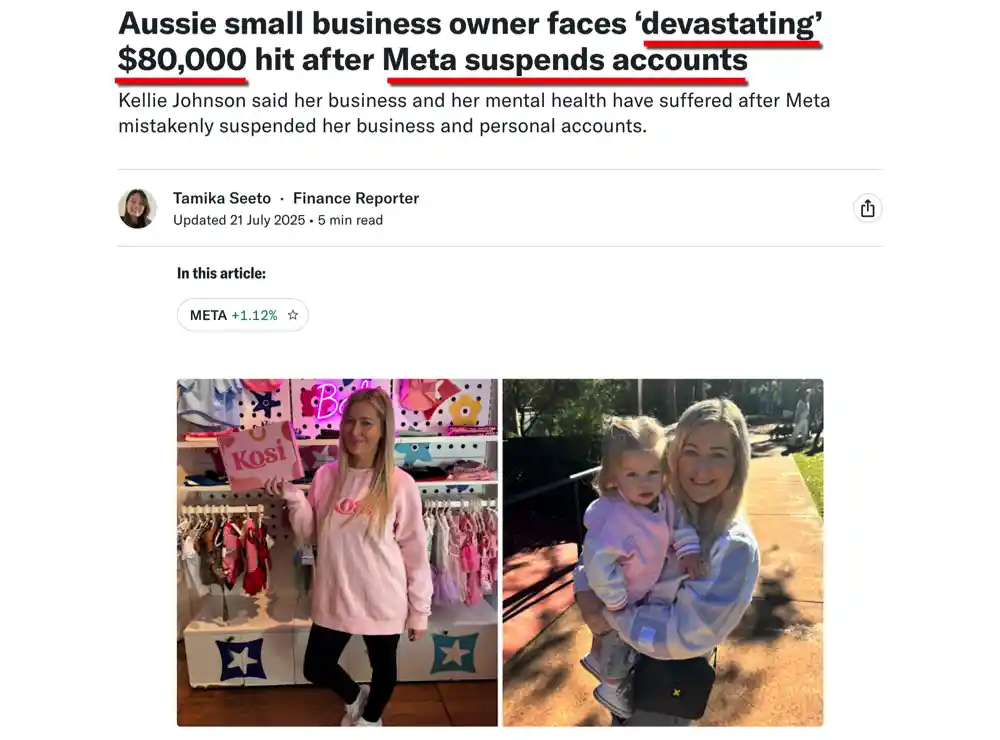
- A small Australian brand lost over half its revenue when Meta mistakenly suspended its account.
- A kidswear store, Pip and Lenny, lost access to its customers when its Facebook page was hacked.
- A cooking school lost 2,500 active followers when Facebook removed its page without warning.
These aren’t rare stories. They happen more often than you think to creators, brands, and even public figures.
But there’s a simple way to protect yourself.
Your website is your home. You make the rules. Even if you get leads through Instagram or WhatsApp, your website gives people a place to learn more, book your services, or buy your products.
“Who’s going to land on my website?”
People who are actively searching for what you offer.
Say someone searches “custom t-shirts in St. Peters” on Google. If you don’t have a website, you’re out of the game. Social profiles rarely show up in search results. But websites, especially those built with SEO in mind, are designed to be found.
If you want new customers beyond your current followers, you need a website.
“I don’t know how to code.”
Tools like ZipWP, Wix, and Squarespace let you create a professional site in minutes. You just describe your business and choose a design. These platforms take care of the heavy lifting.
You can drag, drop, edit, and launch without touching a single line of code. If you need extra help later, you can always bring someone in. For now, just start.
“AI is replacing search. Why create a website?”
AI still needs websites to answer questions. Tools like ChatGPT or Google’s AI search pull from online content. And that also includes your website.
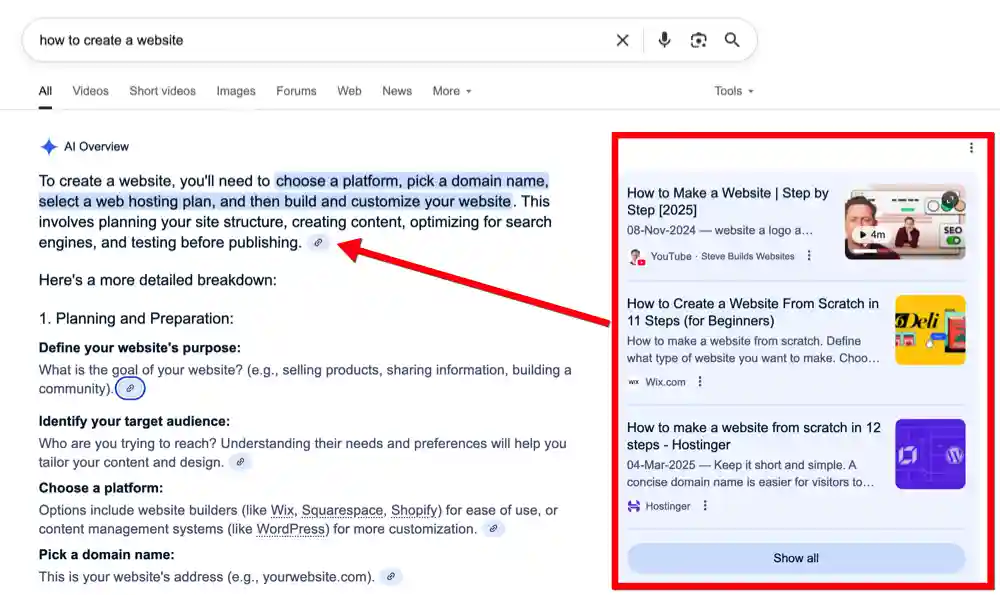
Sure, AI gives summaries. But when people want real answers, reviews, or details before buying, they visit the source. And that source is almost always a website.
Also, notice what most AI tools say right under their answers, “Please verify information. May contain errors.” That’s because websites are still the most trusted and traceable source of truth.
If you want to be visible in 2025 and beyond, you still need a website.
“Websites are expensive.”
They used to be. Not anymore.
You can start a clean, functional website for just $5 to $15 a month. Some platforms even offer free plans to begin with.
If you’re wondering “what do I need to create a website?”, it’s simple:
- A domain
- A website builder or platform
- A clear idea of what you offer
Compared to the cost of paid ads or missed sales? That’s a smart investment.
“I don’t have time to manage a website.”
You don’t need to update it daily.
Think of your website like your digital storefront. Once it’s set up, you just keep the basics fresh: your contact info, services, and current offers.
With the right setup, it’s way easier to manage than responding to dozens of Instagram DMs or WhatsApp messages. A contact form filters the noise and brings in serious buyers.
If you’re selling directly through your site, tracking orders, payments, or bookings is just a few clicks away.
Let’s move on from asking, “Do I need a website for my business?” to understand what actually makes you need a website.
7 Reasons You Do Need a Website
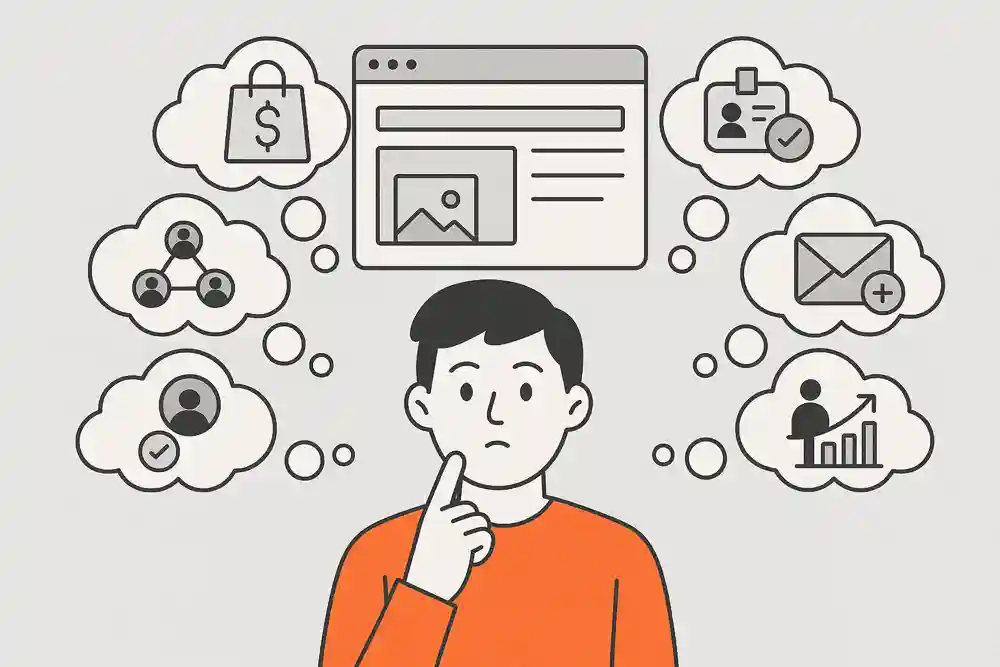
Not sure if a website is the right move for you? Let’s break it down. If any of the following sound like you, then yes, you do need a website.
1. You Run a Business or Side Hustle
Whether you’re full-time or just getting started, you need a place people can find, trust, and learn more about what you do.
Social media helps with visibility, but a website gives you structure and credibility.
Even a simple homepage with your services, a contact form, and client reviews puts you ahead of many businesses still relying on word of mouth.
2. You Sell Products, Offer Services, or Take Bookings
Selling handmade goods, digital downloads, coaching, online classes, or haircuts?
Your website becomes your store, receptionist, and sales assistant all in one.
It can take payments, show off your work, and accept bookings 24/7. And most importantly, it helps people find you when they search for what you offer.
3. You Want to Grow Your Personal or Professional Brand
Websites aren’t just for businesses. If you’re a freelancer, coach, speaker, or content creator, your site becomes your digital home.
It shows your work, shares your voice, and positions you as a professional.
Much more powerful than a social bio or a linktree.
4. You Want to Collect Leads or Build an Email List
Followers are nice, but email subscribers are golden.
With a website, you can offer something useful like a free guide, discount, or checklist in exchange for an email.
Even if social platforms change their rules, you’ll still have a direct line to your audience.
5. You Want Full Control Over Your Content and Audience
Platforms like Facebook, TikTok, or Etsy can change anytime. Accounts get suspended. Algorithms shift.
One small update and your reach or sales could drop overnight.
But your website? That’s your property. You control the look, the message, and the experience.
6. You Want to Look Credible When Someone Googles You
People search online before they buy or trust.
If someone looks up your name or business and finds nothing (or just scattered profiles), it can raise doubts.
Even a simple one-pager builds trust and shows you’re serious about what you do.
7. You Want to Future-proof Your Online Presence
Social platforms come and go, but websites have been the core of the internet for decades.
They grow with you, help with SEO, and give your business or brand a stable home.
If everything you do lives on a platform you don’t own, you’re building on rented land.
Even the Most Followed Celebrities Have Websites
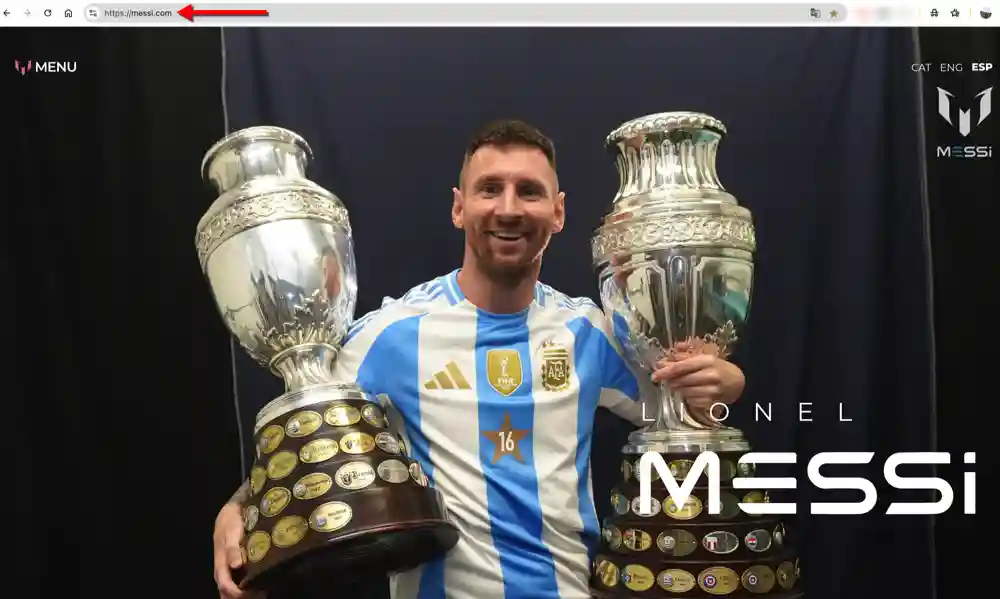
If anyone could get away without a website, it’s the world’s biggest celebrities.
They already have millions of loyal fans on Instagram, TikTok, YouTube, and X (formerly Twitter). A single post can go viral in minutes.
But here’s the thing: they still choose to have websites to build their brands, sell products, share their stories, and stay in control.
Let’s take a look.
Zach King > 140 mn
Known for his magical, mind-bending videos, Zach keeps his website simple but purposeful.
It links to his book series on Amazon and includes a contact form for fan messages and brand deals.
Despite being a viral sensation, he still uses his site as a central hub for connection and business.
LeBron James > 200 mn
LeBron’s site is a textbook example of a personal brand done right. It highlights his journey as an athlete, businessman, and philanthropist, all in one place.
He even shares a digital album of his life and promotes causes he supports. Everything’s organized and in his control.
MrBeast > 500 mn
One of the biggest YouTubers on the planet, MrBeast runs his online store via shopmrbeast.com. He sells merch, chocolates, and kids’ products.
Not only does he use Shopify to power it, but he also encourages others to start their own stores too. He clearly understands the value of owning your platform.
Taylor Swift > 280 mn
Her site stays updated with album drops, tour info, and exclusive merch.
It’s the go-to place for fans who want direct access without relying on social feeds. And she turns all that fan energy into direct sales, not just likes.
Beyoncé > 887 mn
Queen Bey uses her website to support her brand’s visual and fashion-heavy identity.
It promotes the clothing she wears, the brands she endorses, and keeps fans in the loop with new projects. Plus, it doubles as an archive of her body of work.
Cristiano Ronaldo > 1024 mn
You’d think someone with over a billion followers wouldn’t need a website. But visit his site and you’ll see it’s more than just a placeholder.
It showcases milestones, links to his CR7 fashion and fragrance lines, and offers a professional space for media and sponsors.
Lionel Messi > 506 mn
Messi’s website is clean and focused. It covers his latest news, charity work, and partnerships. It’s not flashy, but it gives him a space that’s 100% his.
And when you’re building a global brand, that matters.
These are people who already dominate social media. But they still felt the need for a website because it gives them something social platforms don’t – ownership, control, and stability.
And if it makes sense for them, it definitely makes sense for businesses like yours.
What Social Media Can’t Do (And What a Website Unlocks)
Social media is great for visibility. But if you’re serious about growth, credibility, and control, you need more than a feed.
You need a website.
Here’s why.
Social platforms come with limits. Your account can get hacked or suspended. Algorithms change. Your reach drops. And when that happens, you can’t do much because you don’t own the platform, or your followers.
Plus, social profiles don’t show up on Google the way websites do. If someone searches for your service or name, they may never find you.
| Google Cristiano Ronaldo and you’ll see his website ranking right below his Wikipedia page, ahead of most of his social profiles. Now type “Cristiano Ronaldo fragrance” and you’ll find his website right at the top of the search results. That’s the power of owning a website. It shows up when it matters. |
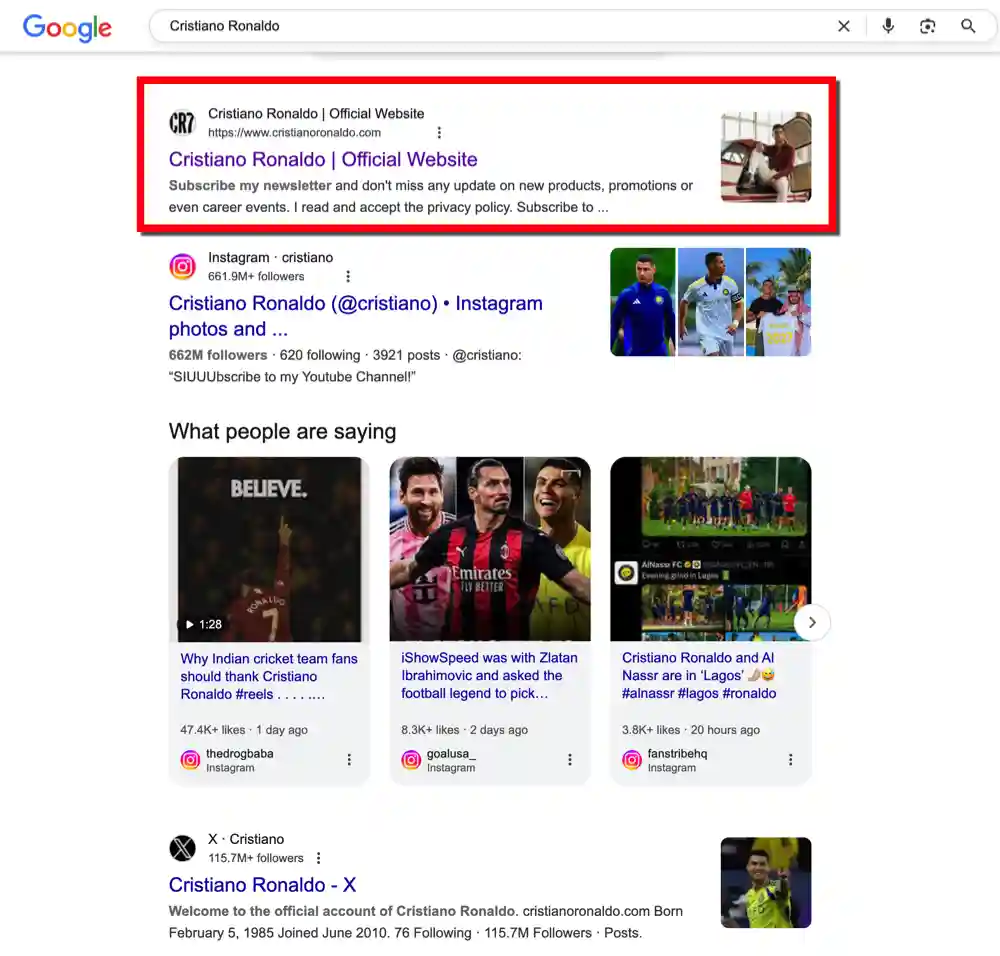
Now, here’s what a website gives you:
- Credibility: A simple website builds trust. It shows you’re legit, not just a profile with a username.
- Control: You decide how your content looks, what gets published, and when. No algorithms gatekeeping your message.
- SEO Visibility: You can rank for the things people are searching for such as “photographer in London” or “online English tutor.” Social can’t do that.
- Sales and Bookings: Your website can take orders, payments, and appointments while you sleep. No middleman, no fees.
- Email Growth: You can build a list of real subscribers, who you can reach anytime, not just when the algorithm allows it.
- Professional Presence: Want to show testimonials, case studies, or your portfolio? Your website lets you lay it all out beautifully.
In short, social media is the party. But your website is your home.
Is Building a Website Still Hard or Expensive?
That might’ve been true ten years ago. But today? Not at all.
You don’t need to write code, hire a designer, or spend weeks planning. Most modern platforms do the heavy lifting for you.
Tools like ZipWP, Wix, Squarespace, and Webflow let you describe your business in a few sentences and generate a ready-to-go website within minutes.
You get clean designs, drag-and-drop editors, and smart features.
And cost? A basic website for your small business can start at just $5–$15 per month. Some even offer free plans to get started.
All you really need is:
- A domain name (like yourname.com)
- A platform to build with
- A clear idea of what you offer
That’s it.
So if you’ve been thinking, “I need a website, but I don’t know where to begin,” now you know. You don’t need tech skills or a big budget to get started.
What Type of Website Do You Need? (With Real-World Use Cases)
The kind of website you need depends on what you do and what goals you have. Let’s walk through a few common types:
Freelancers
If you’re a designer, writer, developer, photographer, or any kind of solo service provider, your website helps people see your work and reach out easily.
Here’s what you need:
- Portfolio page with your best projects or case studies
- About Me section to build trust
- Contact form or booking button
- Testimonials or reviews to show social proof
Example: A freelance logo designer shows 8 recent designs, adds short stories behind each, and includes a “Book a Free Call” button. Simple but powerful.
Small Business Owners
Running a salon, a small restaurant, an online boutique, or offering home services? Then you need a website for your small business with:
- A home page that clearly states what you do
- An about page to tell your story
- Product or service pages with images, pricing, and details
- A contact or booking form
- Customer reviews to build trust
Example: A local bakery showcases daily cakes, includes Google Maps directions, and takes online orders through a simple form.
If someone Googles “best baker near me,” your website helps you show up, not just your Instagram feed.
Creators and Bloggers
Are you sharing ideas, experiences, or creative work online? Whether you’re on YouTube, Instagram, or TikTok, your website is where you own your content.
Here’s what you’ll want:
- A blog or video hub where your content lives
- An email sign-up form with a freebie (like a guide or resource)
- Monetization tools such as affiliate links, merch links, or sponsorship info
Example: A travel vlogger adds all YouTube videos by category, offers a free travel checklist for email sign-ups, and links to Amazon gear.
Marketers and Entrepreneurs
If you’re building funnels, launching digital products, or running paid ads, you already know this, you need a website to convert visitors into buyers.
Build yours with:
- A landing page for lead generation
- A sales page with testimonials, FAQs, and benefits
- Email automation or lead magnet
- Checkout or cart integration if you sell products
Example: A course creator offers a free mini-course, collects emails, and then sells the full course through a beautifully written sales page.
The type of website you need depends on what you want to achieve. But any website is better than no website, especially in 2025.
Why I Decided I Needed a Website
I’m a creator and blogger, and here’s exactly why I decided I needed a website. You might relate to some of this.
1. To Showcase My Work
I wanted a proper space to show my writing, my projects, and my voice. Not a messy feed, but a clean corner that reflects who I am and what I stand for.
2. To Share Without Restrictions
I didn’t want to tiptoe around platform rules every time I had something to say. My website gives me the freedom to speak honestly and stay true to my tone.
3. To Review and Recommend Honestly
There are so many tools out there, but not enough honest opinions. On my site, I say what works and what doesn’t, without worrying about pleasing sponsors.
4. To Learn and Teach What Matters
I read, test, and explore new ideas almost daily. A website lets me document that journey and help others who are figuring things out too.
5. To Build a Career I Control
Instead of waiting around for the “perfect job,” I wanted to create something I own. This website is my base, the place where I can grow, pivot, and evolve.
6. To Stay Connected With You
Social platforms come and go, but emails still feel personal. Through my site, I can share real updates with you directly, without filters or noise.
Final Thoughts
Still asking, “Do I really need a website?” If you want visibility, control, and long-term growth, the answer is yes.
Whether you’re a freelancer, small business, or creator, a website helps people find you, trust you, and buy from you. Social media is where you connect. Your website is where you build.
You don’t need to start big. Just start. Even a one-page site can open doors.
Need help figuring out what to include? Scroll up, I’ve got you covered.
Frequently Asked Questions
Is a website necessary in 2025?
Yes, absolutely. If you care about being visible online, building trust, and having full control over your brand, then you do need a website. It’s no longer optional in today’s digital world.
Can I rely only on social media for my business?
Not safely. Social platforms can ban you, change algorithms, or disappear overnight. A website gives you a stable base that you own and control.
Do I need a website if I sell on WhatsApp or Instagram?
Yes. A simple website helps you showcase your products, collect emails, and attract search traffic from people Googling what you offer.
How much does a basic website cost?
You can start for free or spend as little as $50 to $100 a year. Tools like ZipWP or WordPress + affordable hosting keep costs low.
What’s the easiest way to build a site with no experience?
Use AI website builders. You just describe your business and they generate pages for you. ZipWP, Wix, and Squarespace are all great starting points.
What kind of website should a freelancer have?
A clean site with your portfolio, client testimonials, and a contact form is enough to start landing gigs and building trust.
Is a website better than a Facebook page?
Yes, by far. A Facebook page is rented space. A website is your own property. You control how it looks, what it says, and how it grows.
Do you need a domain name for a website?
Yes. A domain like yourname.com makes it easier for people to find you, builds credibility, and shows you’re serious.
Why do I need a website for affiliate marketing?
You need a hub to post product reviews, guides, and your affiliate links. It helps you build an audience and rank in search engines.
Do bloggers, startups, and local businesses need websites?
Absolutely. Whether you’re writing, selling, or promoting, your website is your online foundation. It can be even more powerful than a physical store.
How do websites make money?
Through direct product sales, service bookings, affiliate income, ad placements, digital products, and even memberships or online courses.
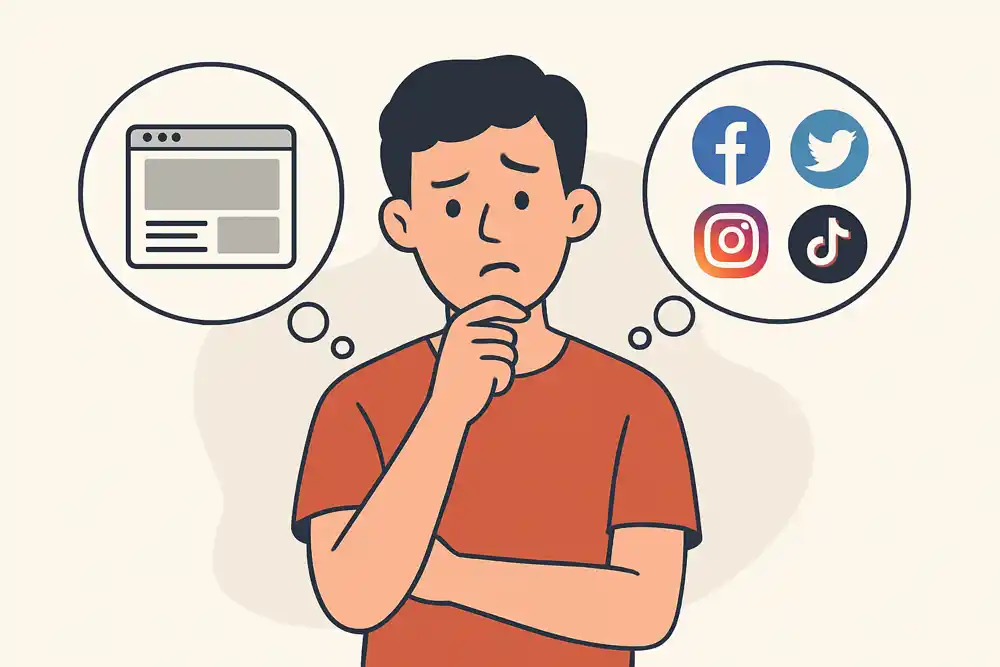
Pingback: How to Create a Website Fast: Super Easy Guide for Beginners – ThinkMJ